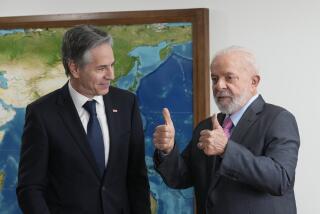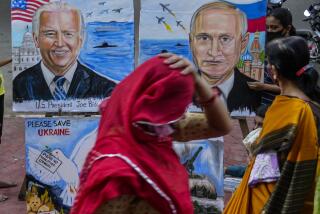Developing Nations Set Economic Agenda
- Share via
CAIRO — Foreign ministers from the Group of 15, an affiliation of developing countries, met here Saturday to pick through the lessons of the Asian financial crisis and try to rally their combined forces in world trade talks.
The ministers were meeting ahead of a three-day summit opening on Monday, which Indonesia’s President Suharto will attend in spite of riots and economic turmoil at home.
Egyptian Foreign Minister Amr Moussa said the G-15 meeting was being held at a “delicate moment” against the background of the Asian crisis and upcoming talks in Geneva on plans for the World Trade Organization.
He said the social impact of reforms must be kept in mind in the coming WTO talks, and the G-15 should cooperate to work for a fair outcome for weaker countries.
“Liberalization [of trade] must be balanced with the requirements of development in the context of achieving the integration of the developing countries in the world trade order,” Moussa said.
“We are all living in the same world,” he said. “The benefit and the harm [of the world economic situation] affect us all in the end.”
Some members of the G-15, which groups Algeria, Argentina, Brazil, Chile, Egypt, India, Indonesia, Jamaica, Malaysia, Mexico, Nigeria, Peru, Senegal, Venezuela and Zimbabwe, have suffered from the fallout of the Asian crisis.
Malaysia has been badly hit by a sharp fall in its stock market and currency since the regional turmoil erupted last July.
Low world crude prices are squeezing oil producers such as Mexico, Nigeria, Venezuela, Egypt and Algeria, which recently said its 1998 government revenue would be cut by nearly $1.2 billion.
Zimbabwe is trying to shake off the effects of currency turmoil and resurgent inflation that swept the southern African country last year.
Argentina has been struggling to rein in a widening trade deficit that has endangered its loan program with the International Monetary Fund.
Before leaving for Cairo, Suharto appealed for an end to anti-government protests--then threatened to use his army and police to quash them.
“I hope the people of Indonesia will not sacrifice the national stability that we have achieved,” Suharto said. “The security forces will take action against whoever disturbs and ruins national stability.”
Hours after his departure, about 100 students marched onto a highway in Jakarta, the capital, and blocked traffic while shouting, “Reform!” Police used riot shields to shove the demonstrators into an alley.
In the West Java town of Bogor, a police officer was killed and another was severely injured after being beaten by protesting students Saturday.
Earlier, hundreds of rock-throwing students tried to march off campus but were blocked, police said.
More to Read
Sign up for Essential California
The most important California stories and recommendations in your inbox every morning.
You may occasionally receive promotional content from the Los Angeles Times.













